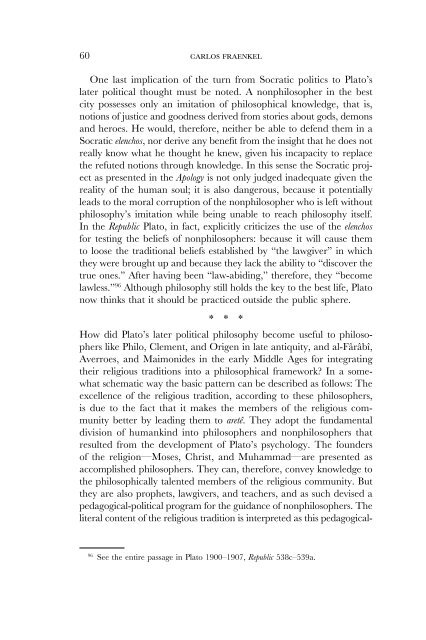Download PDF - Carlos F. Fraenkel
Download PDF - Carlos F. Fraenkel
Download PDF - Carlos F. Fraenkel
Create successful ePaper yourself
Turn your PDF publications into a flip-book with our unique Google optimized e-Paper software.
60 carlos fraenkelOne last implication of the turn from Socratic politics to Plato’slater political thought must be noted. A nonphilosopher in the bestcity possesses only an imitation of philosophical knowledge, that is,notions of justice and goodness derived from stories about gods, demonsand heroes. He would, therefore, neither be able to defend them in aSocratic elenchos, nor derive any benefit from the insight that he does notreally know what he thought he knew, given his incapacity to replacethe refuted notions through knowledge. In this sense the Socratic projectas presented in the Apology is not only judged inadequate given thereality of the human soul; it is also dangerous, because it potentiallyleads to the moral corruption of the nonphilosopher who is left withoutphilosophy’s imitation while being unable to reach philosophy itself.In the Republic Plato, in fact, explicitly criticizes the use of the elenchosfor testing the beliefs of nonphilosophers: because it will cause themto loose the traditional beliefs established by “the lawgiver” in whichthey were brought up and because they lack the ability to “discover thetrue ones.” After having been “law-abiding,” therefore, they “becomelawless.” 96 Although philosophy still holds the key to the best life, Platonow thinks that it should be practiced outside the public sphere.* * *How did Plato’s later political philosophy become useful to philosopherslike Philo, Clement, and Origen in late antiquity, and al-Fârâbî,Averroes, and Maimonides in the early Middle Ages for integratingtheir religious traditions into a philosophical framework? In a somewhatschematic way the basic pattern can be described as follows: Theexcellence of the religious tradition, according to these philosophers,is due to the fact that it makes the members of the religious communitybetter by leading them to aretê. They adopt the fundamentaldivision of humankind into philosophers and nonphilosophers thatresulted from the development of Plato’s psychology. The foundersof the religion—Moses, Christ, and Muhammad—are presented asaccomplished philosophers. They can, therefore, convey knowledge tothe philosophically talented members of the religious community. Butthey are also prophets, lawgivers, and teachers, and as such devised apedagogical-political program for the guidance of nonphilosophers. Theliteral content of the religious tradition is interpreted as this pedagogical-96See the entire passage in Plato 1900–1907, Republic 538c–539a.



